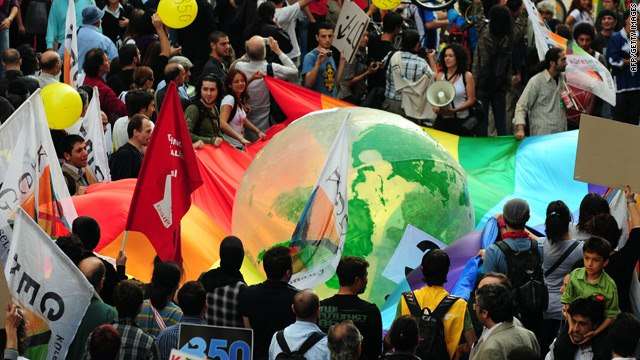The Climate Space in the World Social Forum 2013 in Tunisia, March 26 to 30, will do what the recent negotiations have failed to do: tackle the hard questions, because “we have lost too many important battles in the fight for climate justice that there is little time left for us to stop Mother Earth and humanity from falling off the precipice and into a future too dire to imagine.”
The organizers of Climate Space have already raised some of these critical questions in the lead up to the Forum:
- “What went wrong from Bali to Doha? How can we achieve the target to leave more than 2/3 of the fossil fuels under the ground?
- What are our decentralized energy alternatives?
- How do we tackle the food crisis that is aggravated by the climate and financial crises?
- How do we stop the disruptions of the vital cycles of water?
- How do we respond to the need of employment and stop this suicidal path of endless growth?
- How do we strengthen the fight against false solutions like GMOs, Synthetic Biology, Agrofuels, and Geoengineering?
- What are the implications of the financialization of nature through green economy, carbon markets and REDD?
- What are the threats of climate security for peace, democracy and migrants?
- How do we build alternatives to capitalism from experiences like “Vivir Bien”, the defense of the commons, the happiness index, food sovereignty and other examples that have already been developed from the grassroots?” (http://climatespace2013.wordpress.com/2013/02/06/open-call-to-join-the-climate-space-at-the-world-social-forum-in-tunisia-march-26-30-2013/)
The bottomline is to act on the problems and “bring the solutions to the forefront and put a stop to the harmful false solutions.” The environmental activists and social activists that will gather and meet at the Climate Space workshops and assemblies believe that “action is what is needed if we are to change our future.”
Some of the workshops will discuss the false solutions: Industrial bioenergy; GMOs, Synthetic Biology, Agrofuels; Geoengineering; Commodification and Financialization of Nature: Green Economy; Carbon Markets and REDD.
As Climate Space organizers and participants confront the question “What went wrong and how the situation shall be overcome,” various forms of resistances and alternatives from communities and social movements shall also be highlighted such as energy democratization, public transport, food sovereignty, agroecology and slow food, strengthening of the peoples’ resistance to free trade and corporate power. Another critical issue is the militarization of climate and/or criminalization of activists
Water, a major resource that is in critical condition, is also the main theme in a workshop on “The vital cycles of water and climate change: between the melting of glaciers, freshwater shortages and floods.”
The main organizers and facilitators of Climate Space are:
Alliance of Progressive Labor Philippines
Alternatives International
ATTAC France
Ecologistas en Acción
Environmental Rights Action, Nigeria
ETC Group
Fairwatch, Italy
Focus on the Global South
Global Forest Coalition
Grassroots Global Justice Alliance
Grupo de Reflexão e Apoio ao Processo do Fórum Social Mundial
Indigenous Environmental Network
La Via Campesina
Migrants Rights International
OilWatch International
Polaris Institute
Social Movements for Alternative Asia
Transnational Institute
(For the schedules and themes of various activities in Climate Space, please see: http://climatespace2013.org/ )









